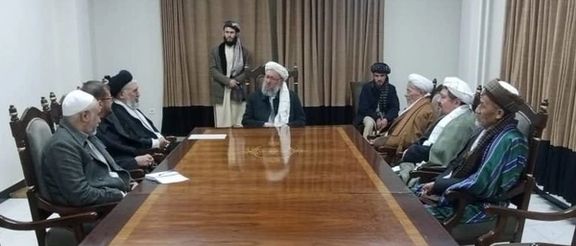Shia Leaders Urge Taliban to Respect Religious Rights, Address Concerns

A group of Shia political activists and clerics has urged the Taliban to seriously address the long-standing concerns of the Shia community in Afghanistan.

A group of Shia political activists and clerics has urged the Taliban to seriously address the long-standing concerns of the Shia community in Afghanistan.
The appeal was made during a recent meeting with Abdul Salam Hanafi, Deputy Prime Minister of the Taliban's caretaker government.
Prominent figures in attendance included Sayed Hussain Alemi Balkhi, former Minister of Refugees, and Mohammad Akbari, a former member of parliament. Both highlighted key issues facing the Shia population and called for tangible responses from the authorities.
In a statement released on Sunday by the Taliban's Prime Minister office, Shia scholars and elders reportedly raised a number of social concerns, urging Taliban officials to give them due attention. While the statement did not elaborate on the specific issues discussed, the Taliban have repeatedly faced accusations of consolidating power and sidelining ethnic and religious minorities, including the Shia community.
There have also been reports of increasing restrictions on Shia religious practices. In some provinces, members of the Shia Ismaili sect have been pressured to abandon their faith. The group has further been criticised for abolishing the Shia Personal Status Law and removing sect-specific religious literature from public access.
Despite these concerns, Hanafi stated that the Taliban view all citizens of Afghanistan as equal, and that discrimination or prejudice of any kind is unacceptable. He added that the government is committed to fair and balanced development across the country, asserting: “Afghanistan is a shared home for all its residents, and everyone can contribute to its reconstruction and progress.”
In previous statements, Waezzada Behsudi, a prominent Shia cleric, called on the Taliban to respect the customs, traditions, and religious beliefs of the people. He also emphasised the need for the current interim administration to transition into a truly national government. “If we have a national administration, the world cannot ignore, humiliate, or exclude us,” he said.
The Taliban, however, have consistently rejected international pressure to form a more inclusive government, labelling such calls as interference in Afghanistan’s internal affairs. They maintain that their administration already represents all groups.
Nonetheless, members of the Shia community have voiced growing frustration over the lack of religious freedom, particularly restrictions on sacred observances such as Ashura, which they say were not permitted under the current regime.
This is not the first time Shia leaders have engaged with Taliban officials. Over the past four years, several similar meetings have taken place, yet community representatives say their demands remain largely unaddressed.